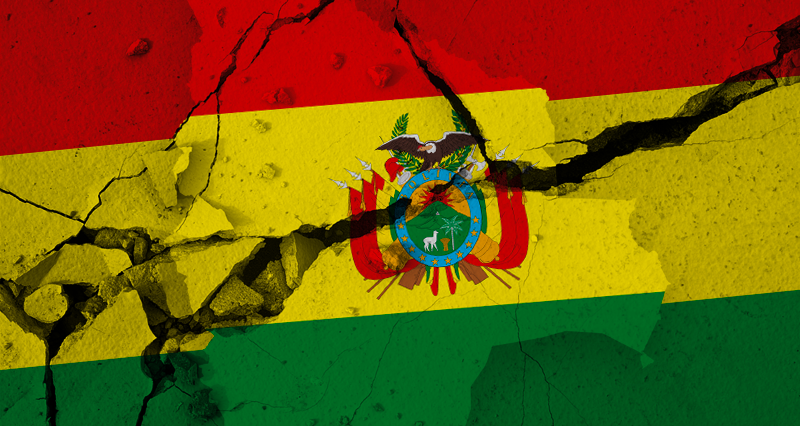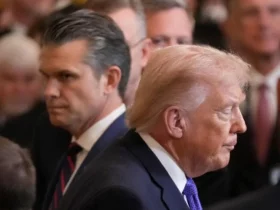By Dr.Fernando Esteche *
Having been the South American country that served as a laboratory to carry out a classic coup d’état in the midst of an era neo-coupism (2019), Bolivia exposes the structural weaknesses of its political system and its recurrent exposure to what we call the mockery of democracy.
The mockery of democracy is precisely the ability of imperialism to turn this system into a system of domination – in a tutelary or restricted system, where popular aspirations are repeatedly frustrated and electoral wills are mocked by the government’s own management.
In this burlesque exercise, the Republic is a category where most of the multiple nationalities that claim to be such in Bolivia are an exponent of the confiscation of their political sovereignty. The whole Bolivian institutional apparatus usually ends up excluding, subalternizing and perpetuating these situations – the popular sectors.
But now, the right wing itself, tributary of the republican system it has built itself, questions it under the banner of federalism, which is nothing more than, in their minds, secessionism. The economic and demographic growth of Santa Cruz and the so-called “White Crescent” makes its colonized bourgeoisies hope for their own little country that does not have to carry the weight of or live with the high poverty.
Hence, the excuse of the Census that would allow, at the expense of its results, to demand a bigger budget and more legislative seats.
The MAS (Movement to Socialism) as a political instrument of the social movements and the popular world came, with Evo Morales at the head, to initiate a process of change to reverse these situations.
It is important to understand that MAS is a political instrument of a group of social movements whose articulation is based on the vindication of their own sovereignty, and that they are social movements of subalternized and exploited majorities, which will directly question the economic system, the structures of property, and vindicate their ethnicity and their work. This is opportune to point out at a time when any sectoral demand can be articulated as a social movement. These are clearly political social movements.
In this scenario, after the narco-coup of 2019 against the MAS government, inspired by sectors of the energy and mining transnationals associated to the agribusinesses of Santa Cruz, and the drug cartels integrated to the DEA of Añez in Beni and sectors of the Armed Forces of Santa Cruz; in a tortuous year of popular resistance, conditions were created to propose elections and recover the government for the MAS.
The victory of the MAS with the candidacy of Arce surpassed the numbers that the electoral force had been harvesting in previous elections. This spoke of growth in consensus.
Now, Luis Arce, with the explicit support of his administration by David Choquehuanca, his vice-president, (who was Evo Morales’ chancellor and leader of one of the powerful indianist sectors of the MAS), assumed a government that soon found “friendly fire” with the return of the exiles.
Within the popular space itself, serious criticisms and vicious accusations began to emerge, which only weakened the political structure and caused great confusion.
At this expense, even popular sectors such as the coca growers of Chapare, who also have a powerful organized force, have remained very hostile to the government’s administration, despite having strong and active links with Evo Morales – or more precisely, because they have such links.
Vice President Choquehuanca was forbidden by the party organization, hegemo nized by Evo Morales himself, to organize political training schools with the clear intention that he could not proselytize from there. This gesture put an end to political training within the political instrument.
The narrative of “failed state” and accusations against the government of drug traffickers coincide in the narratives of Camacho (Santa Cruz coup leader) and sectors of the MAS that have become surprising opponents. The target is the leftist government minister Eduardo del Castillo, who is being criticized by Evo’s former minister, Carlos Romero, and by the drug cartels themselves disguised as opposition political leaders or exporting businessmen.
The apparent agreements to extend in the future the agricultural frontier in favor of agribusiness (clearly pro-coup sectors) in contradiction with the official policy of not doing so, once again expose serious frictions and complex alliances that fully impact on the possibility of cohesion of the popular party space.
In the middle of this year, Arce’s meeting with Evo and with the six federations of the Cochabamba tropics (expressions of evista), beyond the communiqués, was a real failure in terms of building political unity.
On the other hand, the assembly in El Alto brought together the Neighborhood Councils of El Alto and the Regional Workers’ Central. In a press conference, they supported the Arce government and questioned the criticisms of the federations of the tropics, stating that while Evo Morales and his ministers fled during the coup, the people of El Alto stayed to confront it.
In the party meetings they accuse each other of being coup leaders and of wanting to snatch power from each other. The 2025, stripped of ideology and programmatic project is the hinge that divides the waters within the popular sector and taking advantage of this the right wing advances and strengthens itself, achieving that important popular referents end up demanding from the government the same thing that is demanded from the Civic Strike imposed by the Santa Cruz right wing.
Some leaders of the so-called “renovator” sector that Arce and Choquehuanca express have been expelled from the government and suffer judicial persecution from their former colleagues in the judicial apparatus that remains intact since the coup.
The government has made no progress in dismantling the coup and narco apparatus of the Armed Forces nor the repressive and lawfare-colonized apparatus of the Judiciary, much less in challenging the political action of the coup political leaders and businessmen of the same disposition. At this point, its internal weakness prevents it from having such an intention, if it had one.
The conspicuous coup leaders Luis Camacho, Carlos Mesa, Samuel Doria Medina and Rómulo Calvo present themselves as leaders of the social demands. What is painful is to see scenes played out by popular social sectors that end up being functional to the strategy of the Bolivian business right, whose explicit objective is to bring forward the elections and shorten the term of office to allow the right wing to arm wrestle again against a popular movement probably divided by the candidacies.
The census is the banal excuse with which a banner has been built to justify actions of shortages, obstruction of communication routes and destruction of economies. They call these repertoires a Civic Strike, but it is a clear demonstration of forces, including paramilitary expressions that the government and the MAS have not been able to confront and which has a strong imprint of anti-popular violence that has already claimed several deaths in arson attacks on premises and attacks on leaders.
It is clear that Bolivia being the only country in the South that exports lithium with added value and that has state control of production and export, the government of this country becomes a nuisance for imperialist voracity. Once again, USAID, NED and other agencies have returned to operate openly without any kind of restrictions to finance anti-popular policies through the promotion of cosmopolitan onegeism.
There are those who think of the political death of Evo due to his erratic and confused positioning that seems not to distinguish the coup perpetrators and their intentions. Others suppose the political death of the renovators based on their autonomy from the political orientations that Evo intends to impose. Today the legislative assembly itself, with an overwhelming majority of the MAS, is paralyzed by the actions of this internalism. Imperialism is meeting daily with opposition politicians and through civil society politics via NGOs trying to penetrate the will of the trade union and popular organizations.
The high cost of living is becoming a breeding ground in the absence of programmatic clarity.
It is clear that in Bolivia a long term and continuous plan of attrition is being developed with the objective not only of removing Arce but also of defeating the hope that Evo means for his people. The mistakes that could be pointed out to Evo, Arce or Choquehuanca seem to be most of the times provoked by instigators with procuring objectives. It would seem that the protagonists of these attacks are not in conditions to overcome them with political unity and popular organization to confront the coup and deepen the process of change.
* Fernando Esteche is PhD in Social Communication (UNLP), full professor of International Relations (FPyCS – UNLP), professor of Contemporary Latin American History at the University of Plata, Buenos Aires and the director of PIA Global.

















Leave a Reply